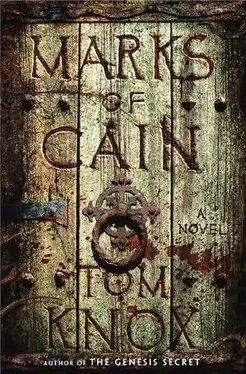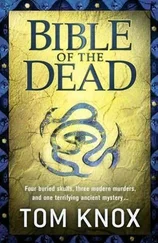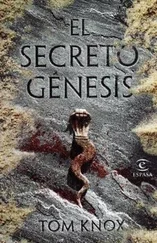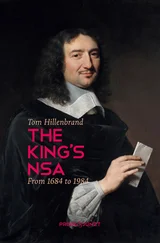Tom Knox - The Marks of Cain
Здесь есть возможность читать онлайн «Tom Knox - The Marks of Cain» — ознакомительный отрывок электронной книги совершенно бесплатно, а после прочтения отрывка купить полную версию. В некоторых случаях можно слушать аудио, скачать через торрент в формате fb2 и присутствует краткое содержание. Жанр: Триллер, на английском языке. Описание произведения, (предисловие) а так же отзывы посетителей доступны на портале библиотеки ЛибКат.
- Название:The Marks of Cain
- Автор:
- Жанр:
- Год:неизвестен
- ISBN:нет данных
- Рейтинг книги:4 / 5. Голосов: 1
-
Избранное:Добавить в избранное
- Отзывы:
-
Ваша оценка:
- 80
- 1
- 2
- 3
- 4
- 5
The Marks of Cain: краткое содержание, описание и аннотация
Предлагаем к чтению аннотацию, описание, краткое содержание или предисловие (зависит от того, что написал сам автор книги «The Marks of Cain»). Если вы не нашли необходимую информацию о книге — напишите в комментариях, мы постараемся отыскать её.
The Marks of Cain — читать онлайн ознакомительный отрывок
Ниже представлен текст книги, разбитый по страницам. Система сохранения места последней прочитанной страницы, позволяет с удобством читать онлайн бесплатно книгу «The Marks of Cain», без необходимости каждый раз заново искать на чём Вы остановились. Поставьте закладку, и сможете в любой момент перейти на страницу, на которой закончили чтение.
Интервал:
Закладка:
'I don't know,' he answered. 'Let's just keep going.'
Another tense and silent hour found them in the remote Pyrenean village of Campan, sequestered and isolated at the end of a side-valley. David buzzed down the window and stared, as they rolled down the main street.
Every house had a large rag doll grinning in the window, or at the door. Gawky rag dolls, almost the size of grown men, were sitting in shop windows. Another big doll was lying on the road, fallen from some high sill — it stared up at the wild Pyrenean peaks that imprisoned Campan.
Amy gazed at the dolls.
'Jesus.'
They parked in a side street and strode to the empty centre of the village. Their route passed a tiny, rundown, shuttered office du tourisme; in the window of the office was a small typed sign. Amy read it aloud, and then translated for David's benefit: the festival of rag-doll-making was apparently a local tradition, for centuries the people of little Campan had made these big effigies, known as mounaques, and in mid September the people would put their handmade rag dolls on display in windows and doors, in shops and in cars.
It was a village of dolls. A village of silent, impassive doll faces, smiling absurdly at nothing. The smiles felt like jeers or insults.
Not that there was anyone to feel menaced or insulted: Campan was deserted, locked up, empty, taciturn, shuttered. One old woman was stepping out of a horse meat shop; she stared their way, then frowned, and walked quickly around the corner.
They reached the main place of Campan. A mournful war memorial, a bus stop, and a shop, also closed, marked the centre of everything; one short road led to a bridge, over the rushing River Adour. Even from here David could see that the opposite bank of the river was utterly derelict, a field of roofless cottages and mouldering barns.
Campan was wholly empty, and half abandoned.
The other road off the place led straight to the church. A metal gate gave onto an overgrown churchyard surrounded by a tall, grey stone wall.
The church door itself was open, so they stepped straight through. The nave was adorned with cheap purple plastic flowers. Four dolls sat on the front pew, staring at the altar: an entire manikin family.
David hunted for twoness, yet he couldn't find it. Campan had one font, one door, one pulpit and four rag dolls grinning like cretins, like inbred retards.
Not two.
Amy maybe sensed his frustration, she put a hand on his shoulder.
'Maybe it's more complicated…'
'No. I'm sure that's it. Two. It has to be.' He was snapping the words angrily, and unfairly. Amy flinched, and he apologized. He said he needed fresh air and stepped outside again, into the churchyard. The overcast autumn day was clammy and oppressive, but still an improvement on the dankness of the interior.
He breathed in, he breathed out, calming himself. Staring lucidly. Working it out. The distant mountaintops peered over the plastered brickwork of the church wall.
David gazed at the wall.
If there was a second door it might be in this strange, high castellated wall, which barricaded the entire churchyard.
His search was hampered by the wet brambles that brawled between the graves. Enormous spiders scuttled from his steps.
'What are you doing?'
Amy had followed him out.
He lifted a hand, without turning.
'Looking…for doors. In this wall. Don't know what else to do.'
He kicked his way through the sodden undergrowth, flattening wild roses, and clambering over broken tombstones. The air was damp to the point of rain; the graves were slippery to the touch. He climbed and slithered and examined.
The wall was intact, the ancient bricks were apparently unpierced. Amy called out.
'Here!'
She was behind him, pulling back some ivy, which had draped one section of the wall. Behind the ivy was a door, shut and dead, but a door. He hurried over and leaned near to see: the tiny door exuded age, the stone surround was crooked, the brown wood was rotten, yet the door was somehow still firm. Resolutely shut. Shut for centuries.
David looked closer. The lintel was carved.
Urgently he ripped away the last coils of ivy and revealed the inscripted symbol in the centre of the stone.
'Here.' He was anxiously excited. 'This arrow. I keep seeing it. The font, the doors, the arrows.'
Amy was shaking her head.
'That's not an arrow.'
'What?'
'I know that's not an arrow.'
'How?'
'Because there's one on a house in Elizondo. I remember walking past it with Jose, one day years back. I asked him what the symbol meant. He was evasive. Oddly evasive.'
'I don't — '
'All I remember is this: what he called it, Patte d'oie. I remember distinctly because he used the French.'
'Patt — what does that mean. Patt…?'
'Patte d'oie. Goose's foot. An ancient symbol.' Amy brushed some more mud from the incised lines, so brusquely carved into the stone. 'This is a goose's foot, not an arrow. It's a webbed goose's foot.'
15
They were on the last leg now: heading for the last place marked on the map. Approaching the heart of the maze.
Navvarenx. Near to Gurs.
Navvarenx was north by a distance, so they pulled over at a garage for more fuel. David walked to the tiny shop, trying to work out what the doors meant. Smaller doors, smaller cemeteries, smaller fonts. Why?
It didn't make sense. Why was everything duplicated in this eccentric, almost insulting way? Was it a kind of apartheid, like benches for black people in 50s Alabama? Like old South Africa?
Or was it something else? Could they be smaller doors for…smaller people?
But that hardly made sense, smaller people could use any door.
A bell jingled as he entered the garage shop; he went straight to the till and bought Amy a new sim card, and an entirely new cellphone — just in case. The garage owner was eating red saucisson and baguette as he totted up the bill. David stared at the sum on the receipt, trying to remind himself he didn't have to worry about money.
Back in the car they were both pensive and subdued. And David felt the sadness tighten as they made the last drive. He thought of his parents. And the memories loomed in his mind, even as the mountains faded behind them in the mirror.
He was on his grandfather's sturdy shoulders, his infant mouth clouded with pink cotton candy. The blue Pacific was sparkling and his mum was young and walking beside them, and his dad was there too, and laughing. When was that? What were they doing there? How old was he then? Five? Seven? Nine? It was a blur, too faint to discern.
And the torment was: he had no one to ask. That was the worst thing. He couldn't ring his mum and say when did we do this, he couldn't ask his granddad and say why did we do that. There was no one left to give him answers, to explain his childhood, to laugh about the funny stuff, to swap memories, to say remember when we went on that picnic. He had been left alone and behind by the others, and David yearned, with a wild sadness, to know why. Granddad had sent him here for a reason, the reason had to explain it all.
It had to.
David gripped the steering wheel tightly. The road into Navvarenx took them through the outlying village of Gurs, which seemed to be virtually a suburb of Navvarenx.
Gurs was straggly. The long French road was lined with parallel trees, whitewashed at the base. There was some kind of strange flat area to the south of town — adorned with a series of glass structures, somewhat like bus stops. David looked at it and looked away. An enormous black crucifix loomed over the flatness; he got an overwhelming urge to drive faster. The cross was so very black.
They drove straight on, straight past the village of Gurs, tucked off the main road, and a few minutes later they were seeing a sign saying Navvarenx.
Читать дальшеИнтервал:
Закладка:
Похожие книги на «The Marks of Cain»
Представляем Вашему вниманию похожие книги на «The Marks of Cain» списком для выбора. Мы отобрали схожую по названию и смыслу литературу в надежде предоставить читателям больше вариантов отыскать новые, интересные, ещё непрочитанные произведения.
Обсуждение, отзывы о книге «The Marks of Cain» и просто собственные мнения читателей. Оставьте ваши комментарии, напишите, что Вы думаете о произведении, его смысле или главных героях. Укажите что конкретно понравилось, а что нет, и почему Вы так считаете.












